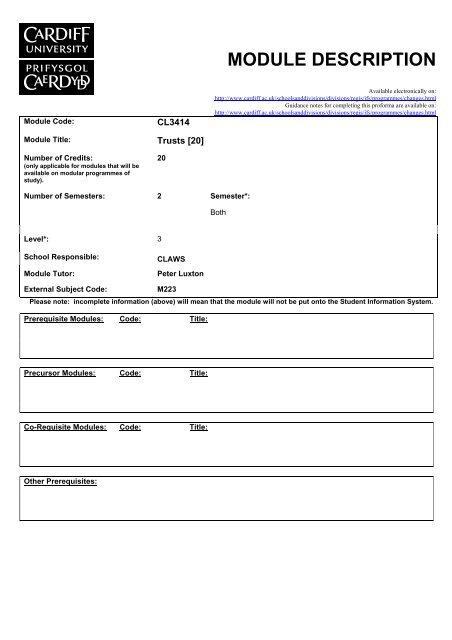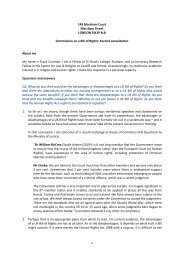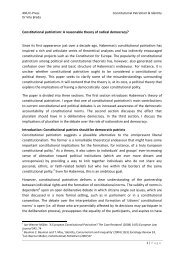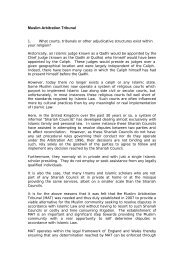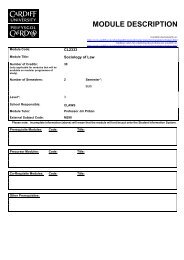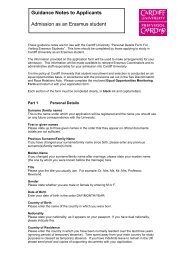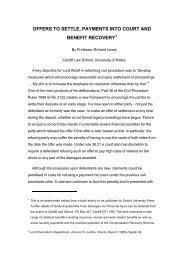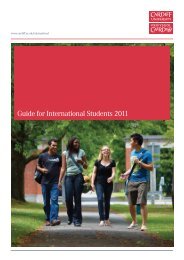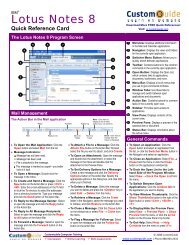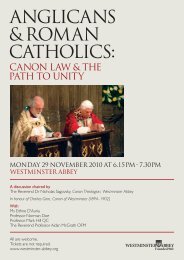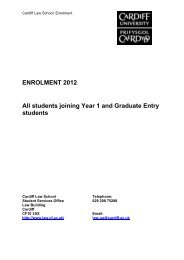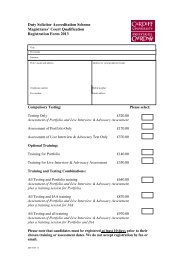MODULE DESCRIPTION - Cardiff Law School
MODULE DESCRIPTION - Cardiff Law School
MODULE DESCRIPTION - Cardiff Law School
Create successful ePaper yourself
Turn your PDF publications into a flip-book with our unique Google optimized e-Paper software.
<strong>MODULE</strong> <strong>DESCRIPTION</strong><br />
Module Code:<br />
CL3414<br />
Available electronically on:<br />
http://www.cardiff.ac.uk/schoolsanddivisions/divisions/regis/ifs/programmes/changes.html<br />
Guidance notes for completing this proforma are available on:<br />
http://www.cardiff.ac.uk/schoolsanddivisions/divisions/regis/ifs/programmes/changes.html<br />
Module Title: Trusts [20]<br />
Number of Credits:<br />
(only applicable for modules that will be<br />
available on modular programmes of<br />
study).<br />
20<br />
Number of Semesters: 2 Semester*:<br />
Both<br />
Level*: 3<br />
<strong>School</strong> Responsible:<br />
Module Tutor:<br />
CLAWS<br />
Peter Luxton<br />
External Subject Code:<br />
M223<br />
Please note: incomplete information (above) will mean that the module will not be put onto the Student Information System.<br />
Prerequisite Modules: Code: Title:<br />
Precursor Modules: Code: Title:<br />
Co-Requisite Modules: Code: Title:<br />
Other Prerequisites:
Version 3<br />
Programmes of Study For Which<br />
This Module Is Compulsory:<br />
Programmes of Study For Which<br />
This Module Is Optional:<br />
Title of Programme: Years: Title of Programme: Years:<br />
LLB <strong>Law</strong> (single honours) (all routes)<br />
F<br />
LLB <strong>Law</strong> and Criminology (Integrated honours) F<br />
LLB <strong>Law</strong> and Politics (Integrated honours)<br />
F<br />
LLB <strong>Law</strong> and Sociology (Integrated honours) F<br />
LLB <strong>Law</strong> and French (Integrated honours)<br />
F<br />
LLB <strong>Law</strong> and German (Integrated honours)<br />
F<br />
LLB <strong>Law</strong> and Welsh (Integrated honours)<br />
F<br />
Certificate in Legal Studies (Exchange)<br />
F<br />
Exchange Programme<br />
F<br />
Module to be offered on a Free-Standing basis<br />
Please identify any additional restrictions to Free-Standing status:<br />
No<br />
* Circle the most appropriate<br />
AIMS OF THE <strong>MODULE</strong>:<br />
(Aims define the broad purpose of the module)<br />
1 to enable students to state and apply the rules of the English law of trusts dealt with in the course accurately and<br />
relevantly;<br />
2 to enable students to make critical assessments of that law and the scholarship pertaining thereto;<br />
3 to enable students to compare and contrast that law accurately and relevantly with the equivalent areas of any other<br />
legal system with which the student is familiar;<br />
4 to enable students to relate that law to the particular circumstances - political, social, cultural - in which it developed.<br />
LEARNING OUTCOMES OF THE <strong>MODULE</strong><br />
(Learning outcomes are statements of what a typical student is expected to know, understand and be able to do.)<br />
On completion of the module a student should be able to:<br />
1 Describe, explain, analyse and evaluate the principal characteristics and concepts of the English law of trusts,<br />
relating them to their political, social, economic, and cultural context. These will include:<br />
1.1 the distinction between common law and equity;<br />
1.2 the equitable remedies of specific performance and injunction, including the freezing injunction and the search<br />
order;<br />
1.3 express trusts;<br />
1.4 implied and resulting trusts;<br />
1.5 constructive trusts;<br />
1.6 completely constituted and incompletely constituted trusts;<br />
1.7 trusts of perfect and imperfect obligation;<br />
1.8 Quistclose trusts;<br />
1.9 discretionary and fixed-interest trusts;<br />
1.10 public (i.e. charitable) and private trusts;<br />
1.11 the powers and duties of trustees;<br />
1.12 personal remedies for breach of trust;<br />
1.13 proprietary remedies for breach of trust, including the rules of legal and equitable tracing.<br />
Knowledge and Understanding:<br />
1 At the conclusion of these modules, students will be able to:<br />
1.1 demonstrate a range of the subject-specific skills and perform all of the general transferable skills accurately<br />
and succinctly in lucid, reasoned prose written in English and/or Welsh.<br />
Intellectual Skills:<br />
PM005<br />
Page 2 of 4
Version 3<br />
1 When presented with a set of facts, a student will be able to do the following:<br />
1.1 state correctly the legal issues which arise from those facts;<br />
1.2 state correctly the relevant rules of the English law of trusts for resolving those issues;<br />
1.3 cite accurately the relevant legal authorities to support the statement;<br />
1.4 state any legal distinctions between the rules stated and the facts given;<br />
1.5 apply the law to resolve those issues correctly and relevantly;<br />
2 When presented with a question or statement containing a value judgement on an area of the English law of trusts,<br />
a<br />
student will be able to:<br />
2.1 state correctly the rules of the English law of trusts which are pertinent to evaluating the proposition contained<br />
in the question or statement;<br />
2.2 state relevant arguments for and against the proposition in an unbiased manner;<br />
2.3 cite correctly the legal authorities and scholarly opinions which support or refute those arguments;<br />
2.4 assess accurately the strengths and weaknesses of those arguments;<br />
2.5 state a reasoned conclusion on those arguments.<br />
Discipline Specific (including practical) Skills:<br />
1 The ability to analyse a set of facts to determine the legal issues raised by those facts, and to provide a reasoned<br />
analysis of the possible resolution of those legal issues.<br />
2 The ability to discuss the arguments both for and against a contentious proposition of law, and to formulate a<br />
conclusion.<br />
Transferable Skills:<br />
1 the presentation of a complex analysis in lucid English or Welsh.<br />
2 the ability to appreciate different arguments on an issue and to present a reasoned conclusion.<br />
METHODS OF TEACHING AND LEARNING:<br />
26 x 1 hour lectures<br />
7 x 1 hour tutorials<br />
ASSESSMENT:<br />
(Description of how the assessment (both formative and summative) will enable a student to demonstrate achievement<br />
of learning outcomes)<br />
The modules will be summatively assessed by means of one two–hour written examination at the end of the course. The<br />
examination will comprise six questions, including both essays and problems. Students will be required to answer three<br />
questions, ensuring that a range of subject-specific skills, every general transferable skill, and the key skills are<br />
assessed.<br />
The formative assessments will consist of one piece of written work (either an essay or a problem) and one multiple<br />
choice test, neither of which will contribute directly to the summative assessment. The first assessment is submitted<br />
before the Christmas recess and the second, the multiple choice test, must be submitted after the Easter recess.<br />
Written feedback is provided after both. The first formative assessment may comprise a question from a previous year’s<br />
formative assessment or from a previous examination paper. Both formative assessments are intended to enable<br />
students to enhance the subject-specific, general transferable and key skills required of them in the summative<br />
assessment.<br />
Together, the assessments require students to demonstrate their abilities to describe, explain, analyse and evaluate<br />
certain of the principal institutions and areas of the English law of trusts.<br />
Formative assessments require students to conduct a limited amount of their own research. The written and oral<br />
feedback addresses their individual attainment in the areas of performance identified in the law benchmarks.<br />
Students are expected to write clear, comprehensible, grammatical and syntactically correct prose in English and/or<br />
Welsh. The first formative assessment should preferably be word-processed; the second needs to be completed and<br />
submitted electronically.<br />
PM005<br />
Page 3 of 4
Version 3<br />
METHOD(S) OF SUMMATIVE ASSESSMENT:<br />
The methods of assessment of a module should be completed in the following table. Notes of guidance for completion of<br />
the table are provided below.<br />
Type % contribution Title Duration (if app)<br />
EXSP 100% Trusts [20] examination 2 hours<br />
Notes of Guidance:<br />
1. All assessments which contribute to the module mark must be separately identified in the above table. Continue<br />
on a separate piece of paper (if necessary) and attach it to the completed module description.<br />
2. Type EXAU Examination Autumn Semester<br />
EXSP Examination Spring Semester<br />
EXSU Examination Summer Period<br />
EXPG Examination held outside Autumn, Spring and Summer periods<br />
PCEX Practical Examination held within the school and organised by the school<br />
CT<br />
Class Test<br />
CW<br />
Coursework<br />
LW<br />
Laboratory work<br />
PW<br />
Project work<br />
FW<br />
Fieldwork<br />
A module may have more than one assessment component of the same type e.g. if a module is assessed by two<br />
essays, both essays would need to be listed with the type CW.<br />
3. Percentage contribution: The contribution of the assessment component towards the calculation of the<br />
overall module mark.<br />
4. Title: A descriptor of the assessment component e.g. examination paper title.<br />
5. Duration: The duration of an examination or class test.<br />
SYLLABUS CONTENT:<br />
All areas of the <strong>Law</strong> Society's ``Foundations of Equity and the <strong>Law</strong> of Trusts'' are covered.<br />
Detailed coverage will include:<br />
− the types of trust<br />
− express trusts, and the requirements for their validity (including constitution, certainty and formalities)<br />
− charitable trusts<br />
− implied and resulting trusts<br />
− constructive trusts<br />
− the powers and duties of trustees<br />
− the remedies for breach of trust (including tracing).<br />
This is mostly a case-based course, although there are important statutory provisions.<br />
INDICATIVE READING LIST:<br />
For 2010-11 the principal recommended textbook is one of the following:<br />
− Hanbury & Martin, Modern Equity (18th ed., Sweet and Maxwell, 2009)<br />
− Parker & Mellows, The Modern <strong>Law</strong> of Trusts (9th ed., Sweet & Maxwell, 2008) £30.00-<br />
− Hayton & Marshall, Commentary & Cases on the <strong>Law</strong> of Trusts and Equitable Remedies (12 th ed., Sweet &<br />
Maxwell, 2005)<br />
CATALOGUE ENTRY:<br />
The course is designed to provide exemption in respect of the <strong>Law</strong> Society's ‘Foundations of Equity and the <strong>Law</strong> of<br />
Trusts’. Because the course is based around the legal concept of the trust, coverage is not restricted to any particular<br />
enterprise or activity, but encompasses a wide and disparate range.<br />
PM005<br />
Page 4 of 4


